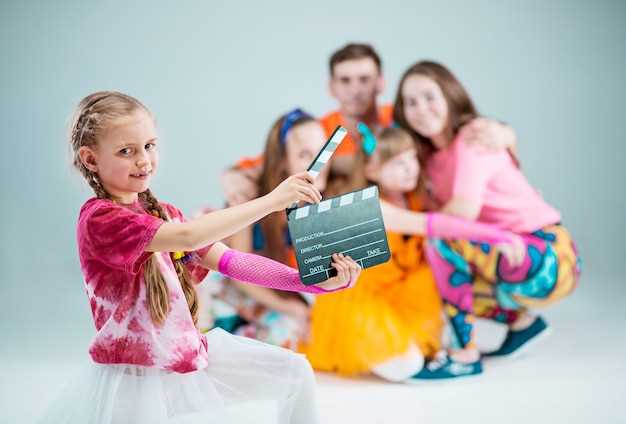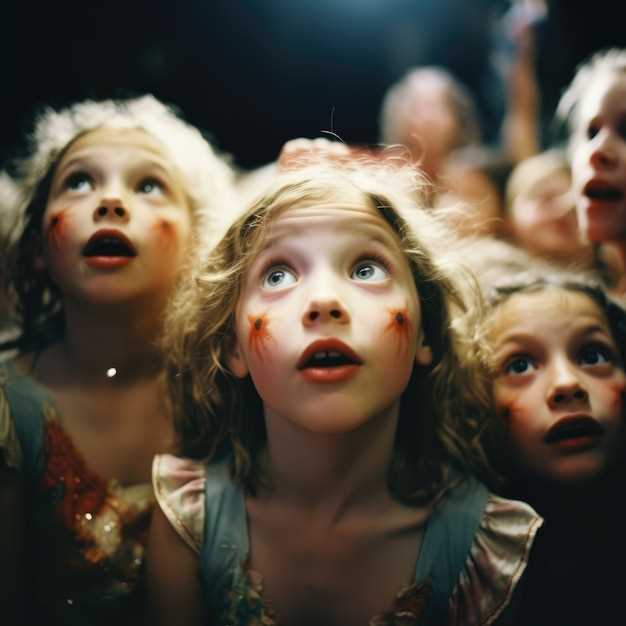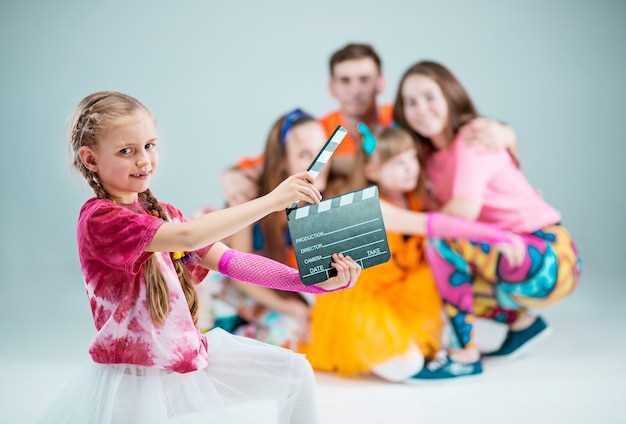Engagement with performing arts opens a unique window to personal growth. Children expose themselves to vibrant experiences, which transform their understanding of the world. They delve into stories and characters, exploring feelings and ideas in meaningful ways. When immersed in this dynamic environment, young minds flourish. It’s not merely about acting–it’s a journey of self-discovery that shapes individuals profoundly.
Interaction and collaboration become key components as participants work with peers. Each rehearsal and performance fosters a sense of community among cast members. They learn to listen, respond, and support one another in various scenarios. This cooperative spirit encourages not only teamwork but also accountability. In each moment spent on stage or in rehearsal rooms, vital life skills emerge naturally.
Building a strong sense of self becomes paramount amidst these artistic endeavors. As children take to the stage, they confront fears and push boundaries. This practice cultivates a resilience that translates into everyday life. Vulnerability on stage transforms into newfound strength off it. Importantly, the continuous feedback loop from peers and mentors reinforces growth in ways that resonate beyond just performing.
Through this vibrant engagement, young people gain the tools needed for effective communication. They learn to express thoughts and emotions articulately. These interactions pave the way for meaningful connections with others. They begin to understand diverse perspectives and appreciate the richness of human experience. Thus, immersion in this field not only entertains but truly shapes character and interpersonal skills.
The Transformative Power of Theatre Education

Engaging in performing arts can profoundly impact young minds. It fosters essential skills, shaping their future experiences. Immersing oneself in this creative realm cultivates various capabilities. Children discover new ways to express thoughts and feelings. This journey not only entertains but also educates in a multi-dimensional manner.
From improvisation to character development, every aspect encourages exploration. The process becomes a safe space for experimenting with emotions. This environment nurtures personal growth and fosters resilience. Young individuals learn to navigate challenges and embrace vulnerability.
- Enhanced imagination allowing for innovative problem-solving.
- Increased self-assurance, providing a foundation for taking risks.
- Improved communication skills, enabling clear expression of ideas.
- Stronger relationships built through teamwork and collaboration.
- Critical thinking enhances, promoting a deeper understanding of diverse perspectives.
Through participation, they engage in a transformative experience that enriches their personal and social development while equipping them with tools essential for future success in life.
Fostering Imagination and Innovation

Imagination serves as a gateway to new ideas and possibilities. It allows young minds to explore beyond boundaries. Harnessing this power fuels originality. When children engage actively, their thoughts leap beyond conventional limits.
Environments that encourage playful expression nurture this innate talent. Through various activities, children learn to visualize scenarios distinctly. They develop their unique perspectives. Inspiration flows freely when they feel safe to share.
In such supportive spaces, innovation flourishes. This process not only sparks joy but also builds critical thinking abilities. Engaging with peers during rehearsals or performances cultivates collaboration and respect for diverse viewpoints.
| Key Aspects | Description |
|---|---|
| Imagination | Encourages exploration and divergent thinking. |
| Expression | Allows children to communicate ideas creatively. |
| Collaboration | Promotes teamwork and appreciation for others’ perspectives. |
| Innovation | Stimulates original thoughts resulting in unique solutions. |
Through engaging in this dynamic process, children not only grow artistically but also emotionally. They learn to trust their instincts and embrace uncertainty as part of exploration. The blending of imagination with practical experiences lays the groundwork for future inventiveness.
Ultimately, fostering these traits is essential. Children equipped with robust imaginative capabilities face challenges with creativity and resourcefulness. This journey transforms not only individuals but also communities, as new ideas emerge and thrive.
Encouraging Original Thought in Young Minds
Fostering imaginative thinking in youth cultivates unique perspectives and ideas. Children often have a natural inclination towards exploration and innovation. Allowing them to express themselves freely nurtures this innate ability. When they engage in innovative activities, their minds flourish. Originality sparks joy and curiosity, which are vital for personal growth.
Encouraging young individuals to voice their thoughts and share feelings can lead to a richer understanding of the world around them. Activities that promote self-expression, be it through storytelling or role-playing, challenge them to take risks and embrace vulnerability. Moreover, when they collaborate with peers in creative environments, they learn to appreciate diverse viewpoints and develop their own unique narratives.
This process not only enhances their ability to think independently but also equips them with tools to engage critically with various subjects. Encouraging original thought does not merely focus on artistic pursuits; it extends into everyday life, allowing young minds to approach problems with innovative solutions. As they navigate through the realms of imagination, they gain confidence in their unique voices and insights.
Ultimately, fostering an environment where original thinking is celebrated instills a lifelong love for learning and exploration. Children grow up recognizing the value of their perspectives. They learn to trust their instincts and ideas, forming a strong foundation for future endeavors. Such encouragement models a mindset where questioning and experimentation are not just welcome but essential components of growth.
Creative Expression Through Performance Arts
Artistic outlets provide young individuals an opportunity to express insights and emotions. Such platforms serve as a canvas for imagination. Through various forms, they communicate complex ideas and narratives. Self-expression becomes a powerful tool, enabling voices to resonate uniquely. The act of performing allows young minds to explore different aspects of their personality.
In environments where performance flourishes, children often discover their true selves. They immerse in roles that challenge preconceived notions, pushing boundaries of thought and feeling. From improvisation to scripted drama, diverse activities foster a sense of playfulness that enhances exploration. Engagement in these activities encourages risk-taking, ultimately cultivated through trial and error.
Every performance transforms into a journey, where participants delve into characters, scripts, and scenarios that ignite passion and enthusiasm. In this dynamic realm, children learn to articulate their beliefs and values, while gaining insights into the perspectives of others. Over time, this exploration not only nurtures artistic skills but also enriches understanding of social dynamics, fostering empathy in everyday interactions. Embracing different viewpoints leads to a broader understanding of the world around them.
Thus, embarking on this artistic adventure lays a foundation for lifelong skills. Expressing oneself through performance cultivates authenticity, as children traverse through various challenges and triumphs inherent in the art form. Each experience, enriched with collaboration and creativity, manifests profound lessons that extend far beyond the stage.
Boosting Self-Esteem and Confidence
Participating in performance arts cultivates a profound sense of self-worth and assurance. Children discover their voice while stepping into diverse roles. Engaging in this vibrant environment fosters an unshakeable belief in their abilities. Each rehearsal and performance serves as a platform for growth. Young individuals learn to embrace their uniqueness.
As they navigate different characters, they experiment with various traits and emotions, allowing them to explore their identity and break free from self-imposed limitations. Through these experiences, they face fears, such as public speaking and interacting with peers, building resilience and a stronger sense of self over time.
Stepping onto a stage transforms trepidation into empowerment. They receive constructive feedback, learn to overcome mistakes, and share joyous moments with their peers. This nurturing atmosphere encourages personal development and helps them realize that every experience is a stepping stone rather than an insurmountable barrier.
In a group dynamic, collaboration becomes key. Children learn to support one another, reinforcing that team spirit uplifts everyone, significantly enhancing their social interactions. With each performance, they gain applause and recognition, which further nurtures their self-image.
Through various activities, from improvisation to scripted plays, they cultivate a fearless attitude. As their confidence soars, challenges that once felt daunting become manageable obstacles rather than intimidating walls. Ultimately, this journey through performance allows individuals to emerge as empowered versions of themselves, ready to confront the world.
Overcoming Fear of Public Speaking
Fear of addressing an audience can be paralyzing. Many individuals experience anxiety when faced with the prospect of speaking in front of others. This sensation often stems from self-doubt and worries about judgment. However, conquering this fear is possible through various methods that foster personal growth. By engaging in activities that involve performance, one can gradually build comfort and skill.
Participating in improvisational games can shift focus from fear to enjoyment. Sharing experiences with peers allows for mutual support. Practicing in a safe environment diminishes anxiety significantly. Real-time feedback from trusted friends boosts morale. Over time, what once felt daunting evolves into an exciting challenge.
Through consistent practice and exposure to public speaking situations, individuals find that anxiety decreases remarkably, allowing their true voices to shine. As confidence grows, articulating thoughts and ideas becomes a powerful means of expression, transforming fear into enthusiasm.
Building a Positive Self-Image
Feeling good about oneself is vital for personal growth. Many experiences shape how children perceive their own worth. Engaging in performance art can significantly impact this perception. It allows young individuals to explore different facets of their personality. Through role-playing, they gain insights into their strengths and weaknesses.
Participating in creative activities fosters an environment of support and encouragement. This supportive atmosphere promotes risk-taking, essential for self-discovery. As kids step onto the stage, they confront fears and challenges. With every performance, they learn resilience, which builds a solid foundation for self-esteem.
- Expressing emotions through acting can lead to self-acceptance.
- Teamwork in productions fosters a sense of belonging.
- Achieving roles boosts belief in one’s abilities.
- Receiving constructive feedback aids in recognizing personal growth.
Ultimately, as children navigate their experiences, they gradually understand their unique value, shaping a more positive self-image that will serve them well beyond the performance space.
Empowering Kids to Take Risks
Exploring new experiences can be a powerful catalyst for growth. Children learn to navigate the world around them, often stepping outside their comfort zones. Embracing uncertainty is an essential part of development. Taking risks cultivates resilience, adaptability, and a sense of adventure. Each bold move opens doors to unforeseen possibilities.
When young individuals engage in challenging activities, they face their fears head-on. This process breeds not only courage but also independence. As they experiment with various roles and scenarios, they learn to manage their own reactions. Such experiences boost their ability to cope with unexpected outcomes, fostering a flexible mindset.
Every improvisation, every creative choice becomes a stepping stone toward personal empowerment. In this environment, they can feel safe making mistakes, as errors are viewed as opportunities for learning. With support from peers and mentors, children discover that taking risks is both rewarding and essential.
Overall, nurturing a mindset that values exploration enables children to build a strong foundation for future endeavors. They become equipped to tackle challenges with enthusiasm and an open heart. Each step taken, regardless of success or failure, contributes to a richer understanding of themselves and the world. The journey becomes more meaningful, creating a legacy of boldness that will serve them well throughout their lives.
Enhancing Social Skills and Teamwork
Engagement in performing arts fosters collaboration and connection among participants. Young individuals discover the importance of working together toward a common goal. They learn to express their thoughts clearly and listen to others. These interactions often lead to building lasting relationships.
Involvement in group activities encourages mutual respect and understanding. Participants share ideas and take on responsibilities, which helps to establish a strong sense of community. As they navigate various roles within a project, children learn the value of each member’s contributions. This experience highlights the significance of compromise and negotiation in teamwork.
Successful performances rely heavily on collective efforts. Every cast member, designer, and technician plays a vital role in the final presentation. When young performers support one another, they cultivate trust and create an environment where everyone feels valued. This foundation allows personal growth and development of interpersonal skills that extend beyond the stage.
Collaboration transforms individual aspirations into shared accomplishments. Through challenges and triumphs, peers develop lasting bonds while honing their ability to communicate effectively and resolve conflicts. This rich environment nurtures both personal and social growth, enabling young individuals to face future challenges with greater ease.
Video:
Pupalife Theatre Play “Children’s Kingdom” for Ashok Leyland School, Hosur
Pupalife Theatre Play “Children’s Kingdom” for Ashok Leyland School, Hosur by Pupa life TV 267 views 2 days ago 52 minutes
Q&A:
How does theatre education enhance a child’s creativity?
Theatre education fosters creativity in children by allowing them to explore different roles, stories, and environments. Through improvisation and character development, kids learn to think outside the box and express themselves in unique ways. Engaging in dramatic play encourages them to use their imagination, experiment with various scenarios, and develop original ideas—skills that are not only essential in the arts but also beneficial in problem-solving and critical thinking across all areas of life.
What impact does theatre education have on children’s confidence?
Theatre education significantly boosts children’s confidence levels. Performing in front of an audience, be it peers or family, challenges them to overcome fears and anxieties. As they rehearse lines and practice scenes, they experience a sense of achievement when they successfully portray a character or receive applause. This newfound confidence often transcends the stage, influencing their participation in other activities, improving public speaking skills, and encouraging them to take on leadership roles in school and social settings.
Can theatre education help improve a child’s social skills? How?
Yes, theatre education can greatly enhance a child’s social skills. Participating in a theatre program requires children to collaborate with others in rehearsals and performances, promoting teamwork and communication. They learn to empathize with their fellow actors by understanding different perspectives through character exploration. These experiences help children navigate social interactions, make friends more easily, and develop better listening skills—all essential components of effective communication in various aspects of life.
Is theatre education suitable for all children, regardless of their personality type?
Absolutely! Theatre education is inclusive and can benefit children of all personality types—from the outgoing to the more reserved. For outgoing children, it provides a platform to showcase their talents and channels their energy. For introverted kids, theatre offers a safe space to express themselves in a structured environment. Encouraging them to step out of their comfort zones at their own pace helps build self-esteem and social proficiency, making it an enriching experience for everyone involved, regardless of their initial level of comfort with social interaction.
